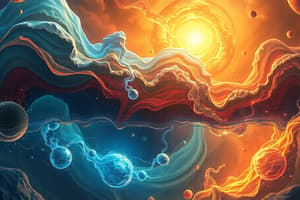Podcast
Questions and Answers
Change in the phase or state of matter is ______
Change in the phase or state of matter is ______
physical change
Chemical change is when composition of matter is ______
Chemical change is when composition of matter is ______
altered
Thermal decomposition is when decomposition of substances to ______
Thermal decomposition is when decomposition of substances to ______
heat
Oxidation refers to any process in which oxygen combines with a ______
Oxidation refers to any process in which oxygen combines with a ______
Aerobic means with ______
Aerobic means with ______
During sublimation, a ______ changes from solid to gas
During sublimation, a ______ changes from solid to gas
Deposition is when a ______ changes from gas to solid
Deposition is when a ______ changes from gas to solid
Aerobic respiration requires ______
Aerobic respiration requires ______
The principle male sex hormone is ______
The principle male sex hormone is ______
The female hormones responsible for teenage acne and occasional moodiness are ______ and ______
The female hormones responsible for teenage acne and occasional moodiness are ______ and ______
During ______, a solid changes from liquid to gas.
During ______, a solid changes from liquid to gas.
The male reproductive system consists of ______, which produce sex cells.
The male reproductive system consists of ______, which produce sex cells.
Glucose is the simplest form of sugar that is obtained from the food we eat and it forms ______.
Glucose is the simplest form of sugar that is obtained from the food we eat and it forms ______.
The ______ gland is the organ that stores urine.
The ______ gland is the organ that stores urine.
______ is when a gas changes from solid to gas.
______ is when a gas changes from solid to gas.
Flashcards are hidden until you start studying
Study Notes
Phase Changes of Matter
- Freezing: Transition from liquid to solid.
- Evaporation: Change of liquid into gas.
- Condensation: Process where gas converts back to liquid.
- Sublimation: Direct transition from solid to gas.
- Deposition: Conversion from gas directly to solid.
- Melting: Process of solid turning into liquid.
Physical vs. Chemical Changes
- Physical Change: Changes in phase or state of matter without altering composition.
- Chemical Change: Involves alteration of a substance's chemical composition.
- Thermal Decomposition: Breakdown of substances due to heat.
- Oxidation: Chemical reaction where oxygen combines with another substance.
Biological Processes
- Aerobic: Refers to processes occurring in the presence of air.
- Aerobic Respiration: Requires oxygen to produce energy from glucose, resulting in carbon dioxide.
Reproductive Systems
- Male Hormones: Testosterone is the primary male sex hormone, responsible for the development of male sexual characteristics and sperm production.
- Female Hormones: Estrogen and progesterone regulate female sexual characteristics and egg production.
- Responsibility of Hormones: These hormones influence physical changes during puberty and can lead to mood fluctuations.
Male Anatomy
- Bladder: Stores urine until it is excreted from the body.
- Prostate Gland: Plays a role in male reproductive health by producing seminal fluid.
Studying That Suits You
Use AI to generate personalized quizzes and flashcards to suit your learning preferences.




